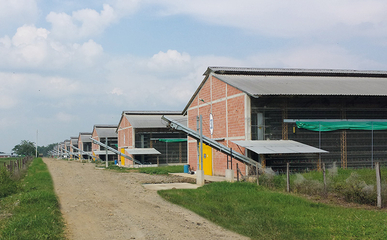South American Egg Producer Invests in German Energy Plant Technology
WELTEC BIOPOWER to Build 800-kW Biogas Plant in Colombia
WELTEC BIOPOWER will shortly start building an anaerobic digestion plant for Colombia‘s largest egg producer. The 800-kW biogas plant is to go live in early 2017. In terms of the feedstock input, the operator Incubadora Santander, which produces about 3.5 million eggs a day, plans to make use of the co-digestion of dry chicken manure from the laying hens and process water from the production.
Since the Colombian government started supporting the generation of renewable energies, especially the agricultural industry has discovered its huge biomass potential. So far, only little of this potential has been converted into green energy. In view of these framework conditions, the egg producer Incubadora Santander has decided to generate energy from biomass. The enterprise – which operates several poultry farms close to the western Colombian province of Cauca – markets its eggs under the “Kikes“ brand in 14 cities in Colombia.
The production yields a great amount of dry chicken manure and process water, with which the 800-kW biogas plant from the German plant manufacturer WELTEC BIOPOWER can be operated without purchasing any additional substrate. The feedstock will be pre-treated in a sedimentation tank. There, the manure will be separated from sand and lime and will be pumped into the 4,903-m3 digester by way of an upstream storage unit with a capacity of 1,076 m3. Through the co-digestion, the digestate will reach a high fertiliser value, enabling it to be returned into the plant‘s agricultural substance cycle for efficient use as liquid manure on its own fields.
The high quality requirements of South America‘s agricultural and food industry were a key reason why the operator Juan Felipe Montoya Muñoz opted for WELTEC technology “made in Germany“. For the sake of hygiene and other reasons, the company prefers stainless steel, a high-quality material, for the construction of the pre-storage tanks and digesters.
Apart from the high quality and the flexible substrate input, compact delivery and quick assembly are additional advantages of this material. Plant modules such as the ready-for-operation CHP plant, the preinstalled pump and control technology and the stainless-steel panels for the tanks will be transported to the plant location in maritime containers from Germany that will pass the Panama Canal. The 80-km waterway cuts the distance from the East Coast to the Pacific Coast by several thousand kilometres. With the WELTEC biogas plant that is to supply power and process heat from early 2017, Incubadora Santander will be well prepared for its expansion plans.
The company, which was established more than 50 years ago, is committed to strong international growth.“An important element of our strategy is to establish the‚Kikes‘ brand around the globe by means of various measures such as direct investments and strategic alliances. In the coming years, we will step up our production to 10 million eggs a day“, explains third-generation company manager Montoya Muñoz.
In line with the customer‘s pronounced international orientation, the customer was impressed with the high degree of international experience of WELTEC BIOPOWER. The plant manufacturer has already demonstrated this experience through the establishment of large biomethane parks and biogas plants for various customers from the waste and food industries as well as from the agricultural and sewage treatment industries. Before making his decision, the Colombian operator toured various plant locations in Germany in order to see this for himself.
With the help of such mature technology, the plans of the Colombian government are likely to succeed: to increase the share of renewable energies in the power network to 6.5 percent by 2020. Especially Colombia‘s agricultural industry is producing large quantities of side products and waste that can be used for energy generation purposes. The country‘s energy potential for biomass is estimated at 16 GWh a year. So far, these have been used almost exclusively for the production of biodiesel and ethanol, but this will doubtlessly change in the near future!











